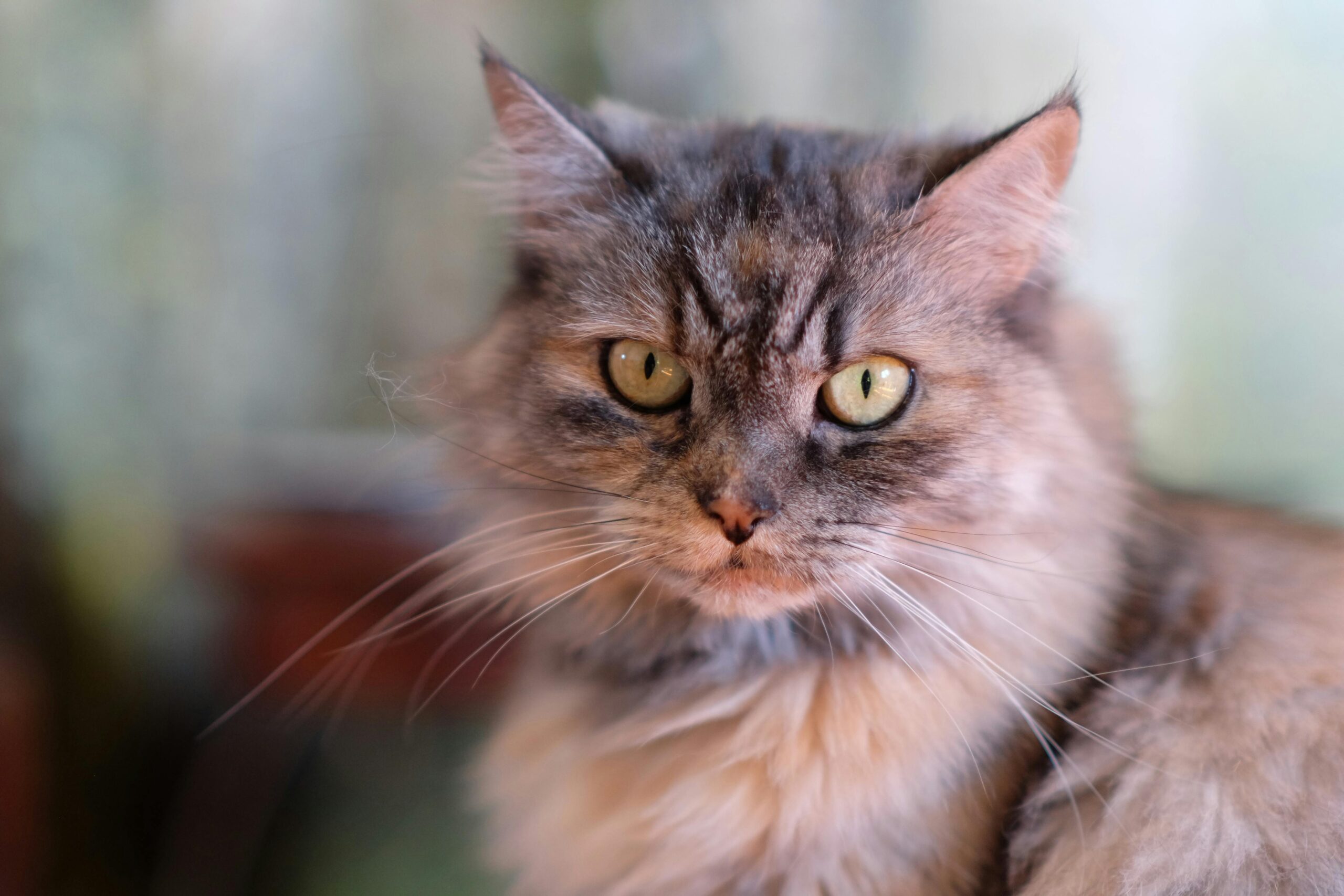Table of Contents
This blog post may contain affiliate links. As an Amazon Associate I earn from qualifying purchases.
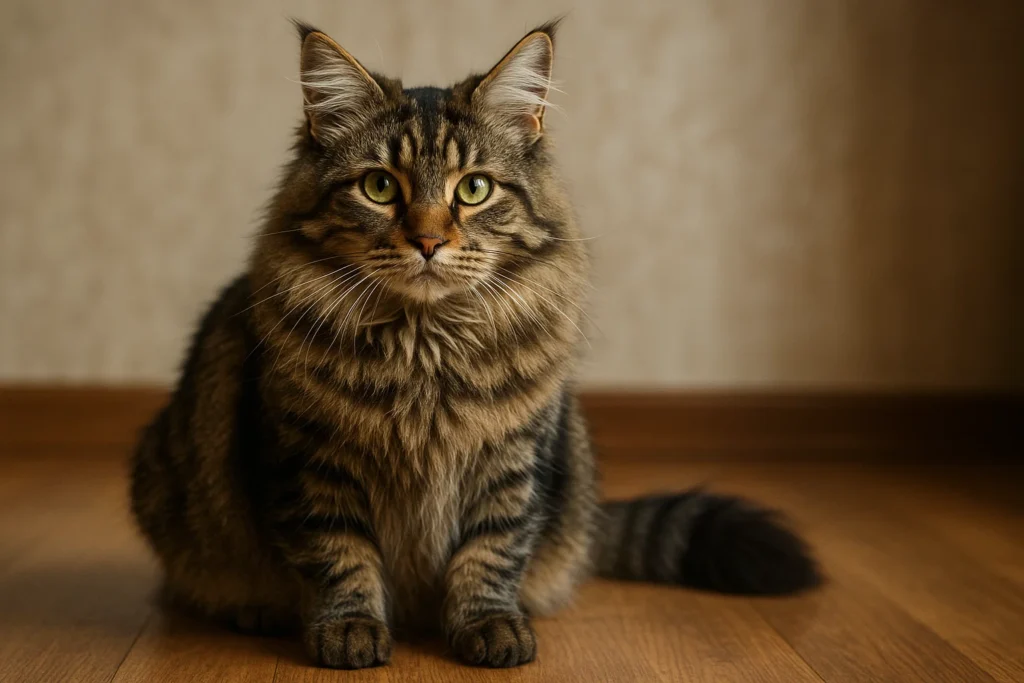
Mad Cat Man‘s fascination with Maine Coon mixes started when I learned these magnificent cats can reach weights up to 35 pounds! I’ve spent years studying these gentle giants, who proudly hold the record for the longest domestic cat ever – an incredible 48.5 inches from nose to tail tip.
I love sharing my knowledge about Maine Coon mixes with fellow cat enthusiasts. These special cats never cease to amaze me with their unique traits. At my home, I’ve noticed how my Maine Coon mix displays the breed’s famous water-loving personality – something quite rare in typical house cats. The most fascinating trait I’ve observed is polydactylism (extra toes), which some Maine Coon mixes inherit. What’s even more remarkable is how these cats take up to 5 years to reach their full size and maturity.
My goal with this guide is to help you understand everything about Maine Coon mixes – from spotting their distinctive characteristics to managing their health needs. I’ll share all my practical experience of living with these extraordinary felines, so you’ll know exactly what to expect if you’re considering bringing one into your home.
Understanding Maine Coon Mix Genetics
I’ve found genetic testing to be a fascinating way to uncover my cats’ Maine Coon ancestry. These tests do more than just confirm breed heritage – they’ve helped me understand my cats’ health markers and inherited traits [13].
DNA Testing Options
When I tested my cats, I discovered professional DNA screening offers remarkable insights. Here’s what I learned these tests can reveal:
DNA Test Features:
| Test Component | What It Reveals |
|---|---|
| Breed Verification | Ancestry percentages |
| Health Screening | Genetic disease risks |
| Trait Analysis | Inherited characteristics |
| Blood Type | Compatibility factors |
The best testing packages I’ve researched examine up to 45+ genetic health markers and blood type indicators [13]. I usually tell my fellow cat owners to expect costs between £72-85 for thorough panels [13].
Inherited Traits Explanation
My study of Maine Coon genetics has shown me how fascinating trait inheritance can be. I’ve noticed these key patterns:
Genetic Inheritance Patterns:
- Polydactyly (extra toes) follows an autosomal dominant pattern [13]
- Heart conditions (HCM) show variable expression [13]
- Blood type inheritance affects breeding compatibility [13]
Breed Verification Methods
Through my experience with DNA testing, I’ve learned the process requires several careful steps:
- Microchip verification by a veterinarian
- DNA sample collection (usually cheek swab)
- Laboratory analysis
- Official documentation of results [4]
Pros and Cons of DNA Testing:
| Pros | Cons |
|---|---|
| Accurate breed verification | Cost investment required |
| Health screening included | Processing time needed |
| Lifetime validity | Some limitations in detection |
Recommended DNA Testing Kits:
MyCatDNA™ Comprehensive Panel
- Tests 45+ health markers
- Includes blood type analysis
- Available on Amazon UK/US
Laboklin Maine Coon Bundle
- Tests 8 essential markers
- Includes HCM screening
- Available through veterinary clinics
Langford Diagnostics Kit
- Specialised Maine Coon testing
- Member discounts available
- Professional laboratory analysis
Hidden Maine Coon Traits in Mixed Breeds
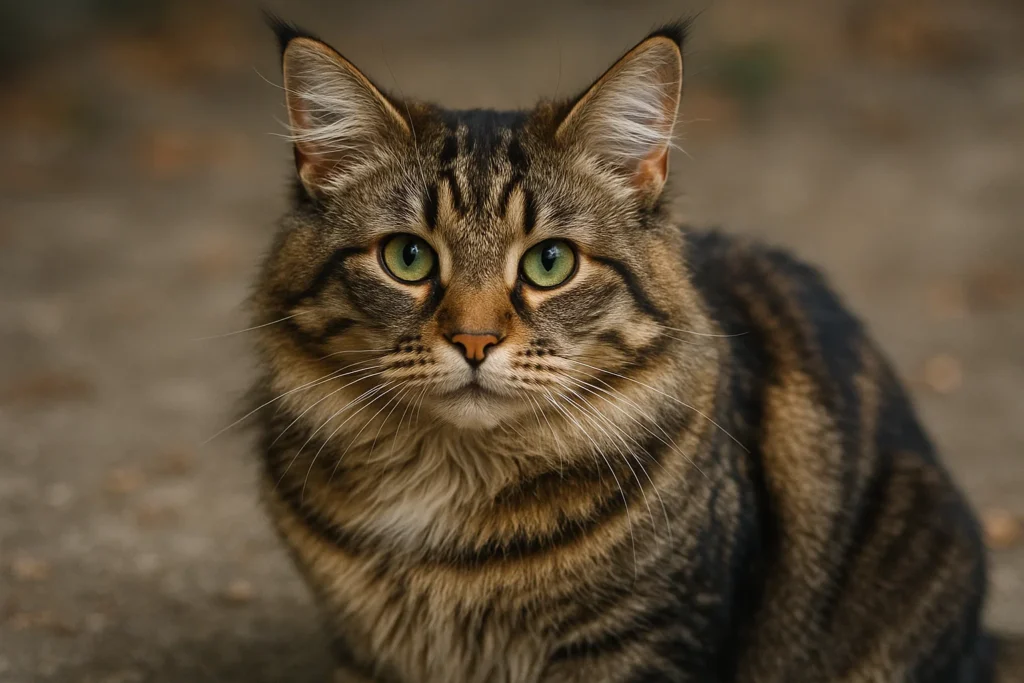
I’ve spent years observing Maine Coon mixes, and spotting their unique traits has become second nature to me. While my mixed-breed cats don’t show all purebred features, they’ve inherited fascinating combinations that make them special.
Subtle Physical Indicators
My Maine Coon mix’s size was the first thing that caught my attention. Male cats like mine can potentially reach 18 pounds [6]. I’ve noticed their distinctive rectangular body shape and broad chest – clear hints of their Maine Coon heritage [7].
Key Physical Markers:
| Feature | Mixed Breed Indicator |
|---|---|
| Coat Type | Thick, dual-layered |
| Ear Shape | Large, well-tufted |
| Paw Size | Larger than average |
| Tail Length | 3/4 of body length |
Personality Markers
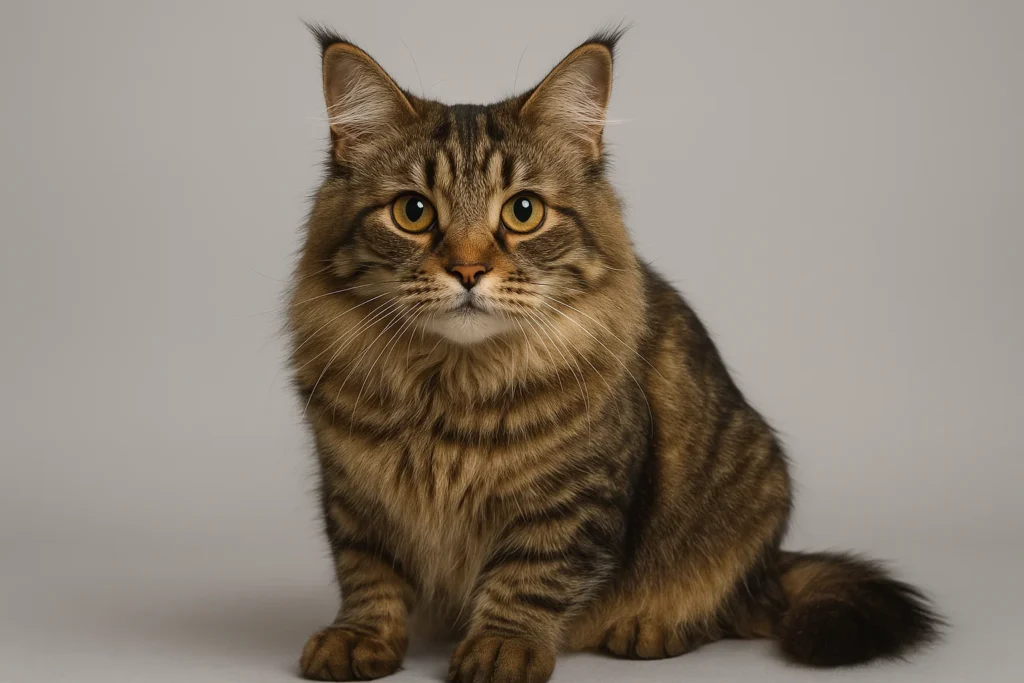
I’m always amazed by my Maine Coon mix’s dog-like personality. He greets me at the door every evening and even plays fetch [8]! These clever cats respond brilliantly to training – I’ve taught mine several tricks using positive reinforcement [7].
Behavioural Traits Do’s and Don’ts:
| Do’s | Don’ts |
|---|---|
| Encourage water play naturally | Force water interactions |
| Provide interactive toys | Restrict exercise space |
| Maintain regular playtime | Ignore social needs |
Growth Characteristics
My Maine Coon mix surprised me with his growth pattern. Unlike my previous cats who stopped growing at 12 months, he continued growing until age four [6]. I’ve tracked his development, which varied based on several factors [9]:
- Genetic makeup
- Gender differences
- Activity levels
- Sleep patterns
- Dietary habits
Recommended Products for Maine Coon Mixes:
Extra Large Cat Tree (Amazon UK/US)
- Height: 180cm
- Base: 60x60cm
- Weight capacity: 25kg
XL Grooming Brush Set (Amazon UK/US)
- Double-sided design
- Ergonomic handle
- Suitable for thick coats
Interactive Water Fountain (Amazon UK/US)
- 2.5L capacity
- Multiple water flow settings
- Quiet operation
Health Considerations for Mixed Breeds
My years of caring for Maine Coon mixes have taught me the importance of understanding their unique health needs. I’ve learned these magnificent cats need special attention throughout their lives due to their genetic predispositions.
Common Genetic Conditions
Through my experience with local Maine Coon communities, I’ve seen several inherited health challenges. Hypertrophic Cardiomyopathy (HCM) affects about 30% of maine coon cats [5] – I’ve sadly witnessed this common heart condition in several cats. I’ve also noticed hip dysplasia, which affects roughly 20% of maine coon mixes [10], causing our furry friends difficulty with jumping and movement.
Genetic Health Conditions Overview:
| Condition | Key Symptoms |
|---|---|
| HCM | Lethargy, rapid breathing |
| Hip Dysplasia | Difficulty jumping, lameness |
| Spinal Muscular Atrophy | Muscle weakness, wobbly walk |
| Polycystic Kidney Disease | Weight loss, increased thirst |
Preventive Care Measures
I never miss my cats’ regular vet check-ups – they’re crucial for catching issues early. My vet recommends annual cardiac ultrasounds after age six [11]. I combine these with routine blood work and physical examinations.
Health Monitoring Do’s and Don’ts:
| Do’s | Don’ts |
|---|---|
| Schedule bi-annual check-ups | Skip regular vet visits |
| Monitor weight closely | Ignore mobility changes |
| Track eating habits | Delay genetic testing |
Recommended Health Monitoring Products:
Pet Health Monitoring Camera
- 24/7 activity tracking
- Movement patterns analysis
- Available on Amazon UK/US
Digital Pet Scale
- Accurate weight monitoring
- Progress tracking
- Available on Amazon UK/US
Automatic Water Fountain
- Encourages hydration
- Philtre system included
- Available on Amazon UK/US
Lifespan Expectations
My Maine Coon mixes have typically lived between 12-15 years [11]. I’ve found that keeping them indoors significantly extends their lifespan. With proper care and regular health monitoring, many of my cats have exceeded these average figures [12].
Factors Affecting Lifespan:
| Factor | Impact |
|---|---|
| Diet Quality | High |
| Exercise Level | Moderate |
| Genetic Health | Significant |
| Environmental Care | Substantial |
Living with a Maine Coon Mix
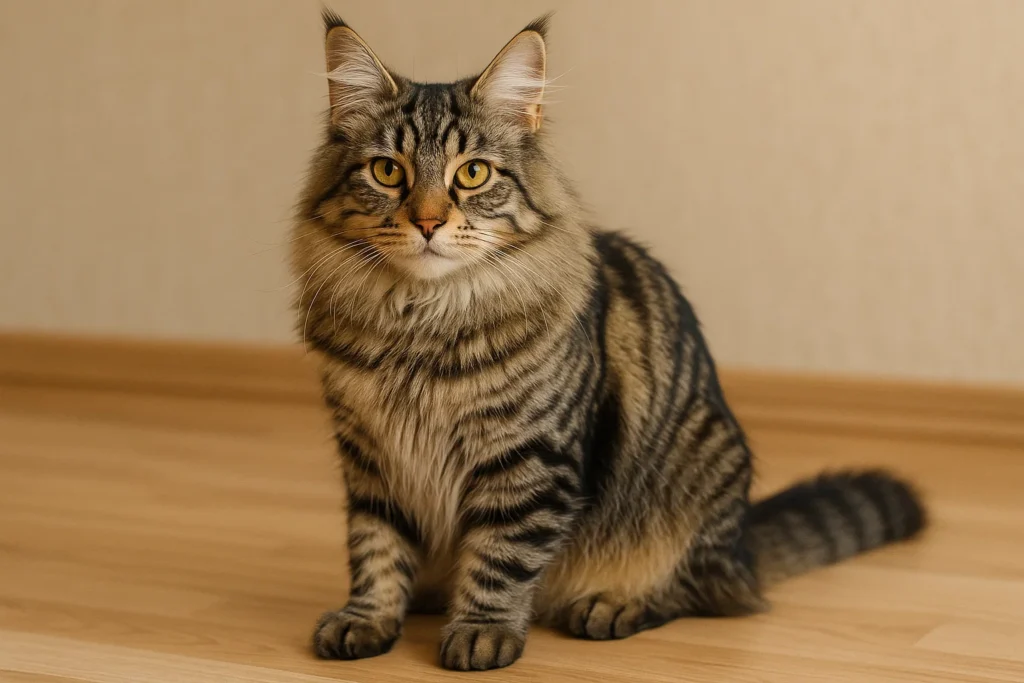
My life with Maine Coon mixes has taught me countless lessons about these extraordinary cats. Let me share what I’ve learned about creating the perfect home environment for these magnificent felines.
Space Requirements
My Maine Coon mix needs plenty of room to stretch his legs and express his playful nature. I’ve found these cats truly flourish in medium to large homes with plenty of exploration space [13]. When I visited friends with Maine Coon mixes in smaller flats, I noticed their cats showing signs of depression and behaviour issues [13].
Living Space Requirements:
| Area | Minimum Recommendation |
|---|---|
| Home Size | Medium to large apartment |
| Vertical Space | Multiple climbing levels |
| Play Area | Dedicated exercise zone |
| Outdoor Access | Secured garden/balcony |
Family Compatibility
The gentle nature of my Maine Coon mix never fails to amaze me. These cats form incredible bonds with children and show remarkable patience [14]. I’ve watched my cat become a protective guardian for my young nieces and nephews [14].
Family Integration Do’s and Don’ts:
| Do’s | Don’ts |
|---|---|
| Supervise initial child interactions | Force interactions |
| Allow the cat to retreat when needed | Leave young children unsupervised |
| Create multiple resting spaces | Ignore signs of stress |
My Maine Coon mix gets along brilliantly with my other pets [15]. Mind you, I always take care with proper introductions to ensure everyone stays happy together.
Training Potential
The intelligence of my Maine Coon mix constantly surprises me. These clever cats pick up training remarkably well [16]. I’ve found they respond brilliantly to positive reinforcement during our training sessions [16].
Recommended Training Products:
Interactive Puzzle Feeder
- Multiple difficulty levels
- Anti-slip base
- Available on Amazon UK/US
Professional Clicker Training Kit
- Ergonomic design
- Training guide included
- Available on Amazon UK/US
Reward-Based Training Treats
- Natural ingredients
- Small, training-sized pieces
- Available on Amazon UK/US
Training Steps:
- Begin with name recognition
- Use consistent commands
- Reward correct actions immediately
- Progress to more complex behaviours
- Maintain regular practise sessions
My training sessions always focus on patience and consistency. I’ve taught my cat everything from basic commands to playing fetch [16].
FAQs
Q: Can Maine Coon mixes live in apartments?
A: Yes, provided they have adequate vertical space and enrichment opportunities.
Q: Are Maine Coon mixes good with dogs?
A: Yes, they typically get along well with dogs when properly introduced.
Final Thoughts – Living with Maine Coon Mixes
Living with my Maine Coon mix has shown me how creating the right environment makes all the difference. Give these cats proper space, family time, and training, and they’ll reward you with extraordinary companionship.
Adopting a Maine Coon Mix
My journey to adopt a Maine Coon mix taught me valuable lessons about finding the perfect feline companion. Let me share what I’ve learned about making the adoption process smoother and more successful.
Where to Find Mixed Breed Kittens
I’ve visited countless shelters and rescue organisations looking for Maine Coon mixes. While finding a purebred Maine Coon in these settings proves quite rare [2], I’ve discovered many wonderful mixed breeds in local animal shelters and rescue groups [3].
Adoption Sources Do’s and Don’ts:
| Do’s | Don’ts |
|---|---|
| Visit multiple shelters | Assume all fluffy cats are Maine Coons |
| Check breed-specific rescues | Rush the adoption decision |
| Verify shelter credentials | Skip background checks |
Questions to Ask Shelters
Before I adopted my Maine Coon mix, I made sure to ask these essential questions:
Health Status
- Vaccination history [3]
- Spay/neuter status
- Previous medical conditions
- Genetic testing results
Behavioural Assessment
- Litter box habits [17]
- Compatibility with other pets
- Previous living conditions
- Energy levels and activity needs
Recommended Adoption Supplies:
Large Cat Carrier
- Airline approved
- Extra spacious design
- Available on Amazon UK/US
Comfort Blanket Set
- Machine washable
- Anti-anxiety material
- Available on Amazon UK/US
Transition Food Pack
- Multiple flavour options
- Digestive support
- Available on Amazon UK/US
Cost Considerations
From my research and experience, adoption fees for Maine Coon mixes vary significantly based on age and location [3]:
Adoption Cost Breakdown:
| Age Group | Cost Range (GBP) |
|---|---|
| Kittens under 1 year | 246.19 [3] |
| Adults (1-7 years) | 206.48 [3] |
| Seniors (8+ years) | 127.07-166.77 [3] |
I’m pleased to share that adoption fees typically include [3]:
- Veterinary examination
- Core vaccinations
- Microchipping
- Initial deworming
- Flea treatment
- FeLV/FIV testing
Final Thoughts – Maine Coon Mix Cats
Living with Maine Coon mixes has been one of my greatest joys as a cat owner. These remarkable felines bring something truly special to a home – a perfect blend of size, intelligence, and the gentlest nature you’ll find in any cat breed.
My years of experience have shown me that Maine Coon mixes thrive with three essential elements: plenty of space to roam, consistent health check-ups, and loads of family time. Yes, they might face some health challenges from their Maine Coon heritage, but I’ve successfully managed these with proper preventive care.
Before you welcome one of these magnificent cats into your home, take time to consider your living arrangements, daily schedule, and budget. While the initial adoption fee starts at £127, I always tell potential owners to think about ongoing costs – from regular vet visits to high-quality food and engaging toys.
The joy these gentle giants bring to family life never ceases to amaze me. My Maine Coon mix shows incredible patience with visiting children and gets along brilliantly with other pets. Their clever nature and social personality make them perfect for active households looking for an engaging feline friend.
What fascinates me most about Maine Coon mixes is how each cat carries its own unique blend of traits. My cat’s distinctive personality quirks and characteristics have brought endless joy and companionship to our family.
FAQs
Q: How can I tell if my cat is a Maine Coon mix?
A: Look for distinctive features like large size, tufted ears, and a long, bushy tail.
Q: Do Maine Coon mixes need special care?
A: Yes, they need regular grooming, health monitoring, and plenty of space for exercise.

